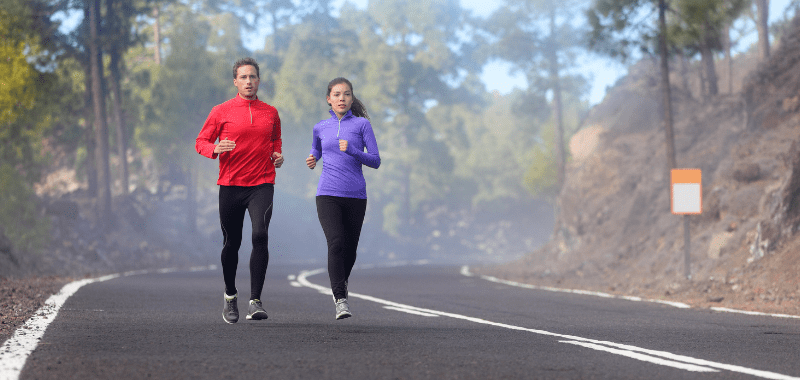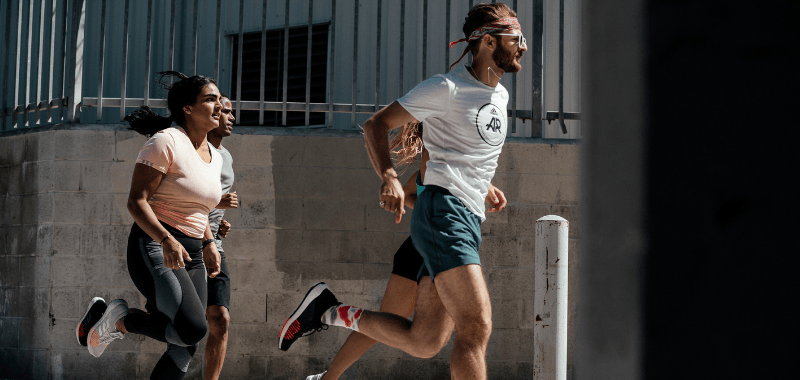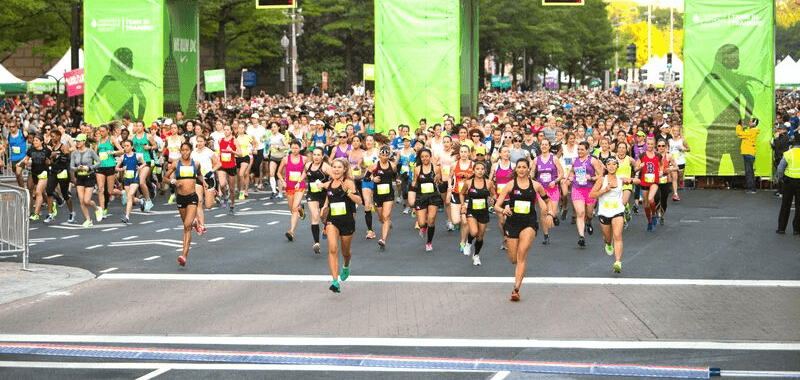Tabla de contenido
By: M. Sc. Sandra Suárez
Sports nutritionist and marathon runner
Learn some tips from sports nutritionist, Sandra Suarez to achieve optimal conditions for running a 15K. Getting the expected results without overexerting your body.
2 days before the race
2 days before the race, change your lunch and dinner for a big plate of pasta with a low-fat sauce, plus a small portion of protein (cheese, chicken, turkey or fish) and a fruit dish for dessert.
Try not to train the day before, so as not to exhaust the body. Rest is also an important part of training
Avoid eating flatulent foods the day before (cabbage, cauliflower, broccoli, cucumber, melon, watermelon).
Drink enough water to stay hydrated, a good way to check if you are hydrated is that your urine is clear and transparent.
The night before, try to get at least 8 hours of restorative sleep.
Plan hydration and energy intake in advance. Follow these tips:
a. Estimate how much fluid is lost in 1 hour of jogging under race-like conditions (time, weather) How?
II. Weigh yourself before running without clothes (e.g. 60 kg).
II. To that weight add what you ingested of liquid (Ex. 60 Kg + 0,5 L= 60,5Kg)
III. Then, weigh yourself again after running and subtract to the weight of the previous point, your post-training weight (Ex. Weight after 59,5 Kg; then, 60,5 Kg – 59,5 Kg = 1Kg = 1L of sweat in 60 minutes).
IV. In this case we could observe that 1L of sweat is lost in 60 minutes.
b. Calculate how much is the minimum you should hydrate during.
I. You need the following data: Current weight (kg); Ex. 60Kg, training time (hours); Ex. 1.5 hours; fluid loss in 1 hour of running. Ex. 1L
II. Calculate 1% of weight: 60 Kg x 0,01= 0,6Kg= 600CC
III. Calculate how much you sweat throughout the race: Sweating in 1 hour= 1L multiplied by the duration of the event. Ex. 1.5 hours; then, 1L x 1.5h= 1.5L of sweat.
IV. Calculate how much fluid you should drink during the race: subtract 1% of your weight from your total sweat: Ex. 1.5L-0.6L= 0.9L.
V. Estimate how much to drink per hour of running: total intake needed; Ex. 0.9L divided by time in hours. Ex.1.5h; thus, 0.9L/1.5h= 0,600L= 600CC/h
c. Check the hydration points that will be available in the race.
I. In the vast majority of races, water glasses are usually given at the refreshment points, whose capacity does not exceed 150cc. or 300cc. bottles.
II. According to the example shown above, 6 small glasses or 3 small bottles will be enough for the whole race.
III. Try not to hydrate or consume gels or gummies, these can contribute to lose the rhythm of breathing. It is always advisable to do it on the flat and/or downhills.
IV. If you do not hydrate well, you will increase your heart rate to compensate for the lack of liquid and you will be forced to lower your level in order to finish the 15K.
d. Calculate the amount of carbohydrates you should consume during; although this should be determined by a sports nutritionist based on your weight and the intensity at which you will be running, as a rule of thumb
I. If your weight is between 40-50 kg: 35 g carbohydrates per hour after the first hour; between 51-60 kg: 45g; between 61-70 kg: 52g and between 71 or more kg: 60g.
II. If you use gels (gu, power gel, isostar, etc) check how many grams of carbohydrates 1 gel has. E.g. Gu gels have 25g each.
III. If you eat an adequate breakfast 60-90 min before the race, start with the gels, gummies or drinks 60 minutes after the start of the race. Example: With a weight of 60kg; a duration of 1.5 hours and consuming the gels from 60 minutes; you will need: 0.5 hours x 45g carbo= 22.5g. If the gel you select has 25g, you will only need 1 gel for the ride.
IV. The gels must be consumed simultaneously with water, 400-450CC of water= 3 small glasses or 1.5 small bottles of 300 cc for each gel, never with energy drinks.
e. Calculate how much salt you should carry during the ride. For this you need to know the liters of sweat you lose per hour; e.g. 1L and the time you will run. Ex. 1.5h
I. Multiply the sweat loss per hour. E.g. 1L, by the time; Ex. 1.5h = 1.5L
II. Multiply the total sweat (L) x 1.5g of salt contained in each liter of sweat: 1.5 x 1.5 = 2.2 g salt (1/2 teaspoon salt).
III. Carry that amount of salt by hand in a small baggie and continuously dip your finger into the baggie to suck the salt throughout the run to avoid hyponatremia.
How to eat on Race Day
- Planning breakfast before the 15k. It is a mistake to go out fasting or to take gels and/or energy drinks before starting, since in some people it could generate hypoglycemia.
a. This meal should be easily digested and consumed 60-90 minutes before. Since the race starts at 7:30 Am, you can do it from 6:00-6:30 Am. How to calculate it:
b. Calculate how many servings of carbohydrates you need: Divide your weight / 15; Ex. 60 kg / 15= 4 servings.
c. Choose any of these foods, (they are expressed as 1 serving): 30 g white bread; 20 g fiber-free crackers; 20 g jam; 20 g corn flake cereal; 100 g fruit (avoid watermelon and cantaloupe) and add 1-2 servings of easily digestible protein: 1 serving= 30 g low-fat cheese; ¾ cup of skim milk or yogurt.
I. Based on our example, breakfast could be: ½ white baguette or 3 slices of white bread (90 g) + 1 tablespoon of jam + 30-60 g low-fat cheese + a little salt.
- Avoid drinking water as soon as you get up. Wait to be already in the corral and 15 minutes before starting (7:15 am) drink 600cc of water. This will cover, according to our example, the hydration of the first hour. Start hydrating after that time.
- Use everything planned in the previous points during the ride so that you finish with your best time and in perfect condition.
At the end: recovery
Just after finishing, try to consume high glycemic index carbohydrates, preferably salty: pretzel, energy drinks, crackers, white bread, etc.
Consume ½ teaspoon of baking soda dissolved in water or energy drink right after finishing.
Consume the necessary amount of liquid until you get a clear urine.
Looking for a plan that trains with you, not against you?
At running.COACH, we don’t just build a schedule. We create a smart, living plan that evolves with you. It understands your level, your race goals and your real life. Whether you sync your GPS watch or train straight from our iOS or Android app, your plan adjusts automatically as you improve.
From day one, you’ll feel the difference:
- A fully personalized, dynamic plan designed for you.
- Automatic sync and effortless workout tracking.
- Real-time updates when life happens, including missed sessions, new races or schedule changes.
- Simple, science-backed guidance to train smarter and recover faster.
🎁 Start today and enjoy your first 30 days free.
Because the best training plan isn’t one you follow. It’s one that follows you.app.











0 Comments